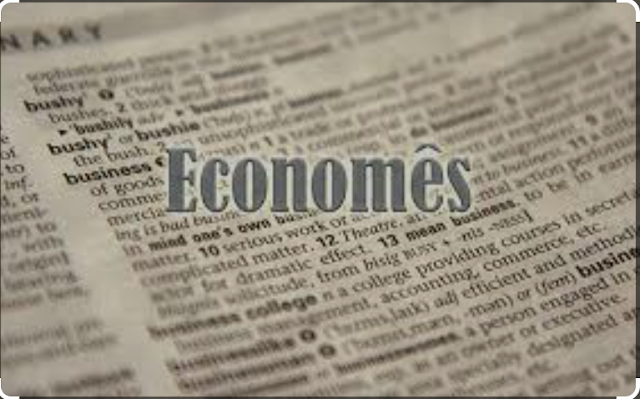DE A a Z da CIÊNCIA ECONÔMICA - A
Termos econômicos, de "vantagens absolutas" a "jogo de soma-zero", explicado para você em Português Simples.
Economic terms, from “absolute advantage” to “zero-sum game”, explained to you in plain English.
LETRA A
Vantagem absoluta
Um conceito que ajuda a explicar o comércio internacional, Se um país A é o melhor em fazer torradeiras que o país B, e B é melhor fazendo chaleiras que A, faz sentido para cada país focar na área onde ele tem essa vantagem, e então negociar torradeiras por chaleiras. Mas veja, muito importante. Vantagens comparativas.
Absolute advantage
A concept that helps to explain international trade. If country A is better at making toasters than country B, and B is better at making kettles than A, it makes sense for each country to focus on the area where they have this advantage, and then trade toasters for kettles. But see, more importantly, comparative advantage.
Gerenciamento Ativo
Um ramo da gestão de investimentos que tenta superar outros investidores selecionando um número limitado de ativos e negociando-os regularmente. Consulte também Gerenciamento Passivo.
Active management
A branch of investiment management that attempts to outperform other investors bv selecting a limited number of assets and trading them regularly. See also passive management.
- A risk associated with insurance, and linked to asymmetric information. People who are worried about their health will be more inclined to pay for health insurance than those who are fighting fit. One way to avoid the problem is to make insurance compulsory for all, as happens with car ownership. For more detail, see our Schools Brief.
- Agency costs
- The expense involved in using a third party to carry out a task. Examples include hiring a fund manager to look after an individual’s investment portfolio, or the cost to shareholders of having professional managers run a business. See also principal-agent problem.
- Aggregate demand
- The flow of spending, across the economy, on goods and services. Demand can fall, even if people’s income and wealth are unchanged, if they decide to save, rather than spend.
- Agriculture
- The cultivation of crops and the tending of animals for the purpose of supplying food. For millennia, this was mankind’s primary economic activity.
- Alpha
- That part of an investment return that is due to the skill of the fund manager. This can be very hard to measure.
- Amortisation
- The gradual reduction in the value of an asset (or a debt) over time. A debt (such as a mortgage) is amortised via regular repayments. Companies use amortisation to steadily reduce the value of intangible assets on their balance-sheets.
- Animal spirits
- Term used by John Maynard Keynes to describe sentiment among businesspeople and consumers. If sentiment is depressed, economies may struggle to escape from recession. For more detail, read this article. See also Keynesian economics.
- Antitrust
- Term used to describe laws or regulations designed to stop firms from exploiting their monopoly positions in markets at the expense of consumers or rival businesses. To learn more, see our Schools Brief.
- Appreciation
- The rise in the value of an asset. In particular, currencies are often described as appreciating when they go up and depreciating when they go down.
- Arbitrage
- The practice of exploiting price differentials in different markets; for example, buying an asset cheaply in London and selling it for a higher price in New York. Thanks to the speed of modern information flows, risk-free arbitrage opportunities are rare. See also regulatory arbitrage.
- Asset
- Something that can be used to create economic value. An asset can be tangible, such as a building or machinery or intangible, such as a patent or a brand name. Assets make up one side of a company’s balance-sheet; the other is liabilities.
- Asset stripping
- The practice of buying a company and rapidly selling off the component parts with the aim of making a profit. This often leads to great disruption in the business and a loss of jobs.
- Asset value
- One measure used by investors to calculate the worth of a company. Normally, a company’s debts are deducted to calculate a net asset value. Also known as book value.
- Asymmetric information
- This occurs when one party to a transaction knows more than the other. Asymmetry can lead to market abuse, as when those with inside information of a coming takeover buy shares in the target company. It can also lead to inefficiencies. Since buyers of used cars know less than sellers, they will be inclined to regard all cars as potential “lemons”, leading to lower prices. See also adverse selection and moral hazard. To learn more, see our Schools Brief.
- Auctions
- These are usually associated with the sale of livestock, antiques and works of art. But in recent decades, they have been favoured by economists as a means of ensuring that sellers get the best price for a wider range of assets. For example, governments have used auctions to sell off parts of the electromagnetic spectrum to mobile telecoms companies. See this article for more detail.
- Austerity
- A term used to describe efforts to reduce the share of public spending in GDP, particularly in the 2010s. When the economy is already weak, Keynesian economists view austerity programmes as a mistake, because they reduce demand. But free-market economists worry that, without austerity, the government’s role in the economy inexorably expands over time.
- Escola Austríca
- Um grupo de economistas libertários, destacando-se Friedrich Hayek e Ludwig von Mises, priorizavam o indivíduo e desconfiavam profundamente do planejamento estatal. A escola se desenvolveu em oposição ao Comunismo e à Social Democacia e acredita em impostos baixos e um estado mínimo.
- Austrian school
- A group of libertarian economists, notably Friedrich Hayek and Ludwig von Mises, focused on the individual and deeply suspicious of state planning. The school developed in opposition to communism and social democracy, and believes in low taxes and a minimal state.
- Autarky
- Self-sufficiency. Authoritarian regimes sometimes pursue a policy of autarky in order to reduce their dependence on other countries. Economists generally regard this approach as inefficient since trade in goods and services allows a country to specialise in those activities which it is best at producing, exploiting comparative advantage.
- Capitalismo Autoritário
- Normalmente usado para China e Russia, isto descreve economias com grande empresas que co-existem com um governo autoritário. As empresas podem até ganhar dinheiro, mas se ousarem criticar o governo ou parecerem muito independentes, elas podem enfrentar sanções criminais ou financeiras.
- Authoritarian capitalism
- Usually applied especially to China and Russia, this describes economies in which big business co-exists with an authoritarian government. Businesses are allowed to make money but if they dare to criticise the government, or appear too independent, they may face criminal or financial sanctions.
- Backwardation
- A term used in the commodity market for when the price for delivering a product today (the spot price) is higher than for delivery in future. Normally, the future price is higher, a situation known as contango. Backwardation is normally the sign of a supply shortage, causing traders to compete to get the product immediately.
- Balance of payments
- A term used to describe a country’s transactions with the rest of the world. The import and export of goods and services are captured in the current account, which also includes investment income and transfers (such as expatriate workers sending money home). The capital account captures financial transactions such as foreign direct investment or purchases of bonds and equities. These will balance in the sense that a current-account deficit (or surplus) must be offset by a capital-account surplus (or deficit).
- Balance-sheet
- In accounting, a statement of the assets and liabilities of a business. It must balance in the sense that assets equal liabilities. The assets such as cash or equipment or inventory are being used in the business; the liabilities show how those assets were funded whether in the form of debt (owed to creditors) or equity (owed to shareholders).
- Bank rate
- Term used in Britain to describe the official rate set by the Bank of England when it pays interest to commercial banks. By manipulating this rate, the Bank of England affects the level of rates that businesses and consumers pay to borrow money.
- Bank run
- In a crisis, bank depositors may start to doubt they will get their money back. So they may demand to withdraw it. Since banks have lent out this money, it is impossible for them to repay all depositors instantly. The bank may fail. To avoid this, most countries have schemes of deposit insurance.
- Banks
- Institutions at the heart of the financial system. Commercial banks take in deposits and make loans, thereby creating money. In a crisis, banks may cease lending (or insist on the repayment of past loans) causing immense economic damage. Investment banks advise on transactions such as acquisitions and make markets in financial assets such as bonds and shares. Many institutions act as both commercial and investment banks.
- Barter
- The direct swap of goods and services for other goods and services, without the use of money. This is normally a less efficient form of trade, since the wants and needs of buyers and sellers rarely match exactly.
- Basis point
- One hundredth of a percentage point. The term is often used to describe interest rate changes. A quarter-percentage-point rise or fall in rates is described as 25 basis points.
- Baumol’s cost disease
- In theory, workers should get higher pay because they get more productive. But an economist called William Baumol noticed this isn’t always true; musicians take the same time to play a string quartet as they did in Mozart’s day, but are paid more nevertheless. The reason is competition for labour; musicians can take other jobs. So rising wages in productive parts of the economy (eg, manufacturing) lead to higher wages in less productive sectors. For more on the disease, read this article; for more on Baumol, read this one.
- Bear
- Investor who expects the price of an asset or assets in general to fall.
- Behavioural economics
- School of thought that believes that the economic decisions of individuals are often driven by psychological biases rather than the rational analysis of expected returns. One example is the endowment effect. Individuals value the goods they own more highly than they would pay for the same item in an open market. For more, see this article.
- Beta
- This ratio measures the sensitivity of an individual asset’s price to that of the overall market. A stock that tends to go up even more rapidly than the market when it is rising, and drop more precipitously when it is falling, is described as “high beta”; one that moves less violently than the market is “low beta”.
- Big Mac index
- A light-hearted guide to whether currencies are over- or undervalued, invented by The Economist in 1986. The index is based on the theory of purchasing-power parity—the notion that in the long run exchange rates should tend to equalise the prices of goods in different currencies. Fresh helpings of burgernomics are served up regularly. You can tuck into the latest—with a side of more details about the index—here.
- Bill of exchange
- A short-term financial instrument, originally used to finance international trade. The buyer of goods would give the seller a signed bill, equal to the value of the purchase, which the seller could then cash with a banker. In modern finance, bills are a catch-all term for short-term debt such as Treasury bills and commercial bills.
- Blockchain
- A distributed ledger used to make a digital record of the ownership of assets, in particular cryptocurrencies.
- Bonds
- IOUs issued by a borrower which normally promise repayment of the money on a set date (the maturity) with regular interest payments during the life of the bond. The more risky the issue, the higher the interest rate (or yield) on the bond. Governments issue bonds to cover the gap between the amount they receive in taxes and the amount they spend. Companies issue bonds to finance investment programmes.
- Book value
- Another term for asset value.
- Boom
- A state of rapid economic expansion, as opposed to bust.
- Bounded rationality
- A theory which assumes that, while individuals try to act rationally, there is a limit to the amount of information they may have, or can absorb. This may make their decisions look irrational (see also behavioural economics).
- Bretton Woods
- Location in New Hampshire of a conference in 1944 which decided the post-war economic order. It led to the establishment of the International Monetary Fund and the World Bank. And it agreed on a currency system that linked all currencies at fixed exchange rates to the dollar, which was convertible into gold at $35 an ounce.
- Bubble
- The concept that asset prices can rise far higher than can be justified by their fundamentals, such as the expected cashflows that will derive from them. A famous example is the South Sea bubble of the early 18th century. Economists who believe in efficient markets are dubious that bubbles ever occur. Identifying bubbles at the time isn’t always easy: see this article.
- Budget
- The annual process through which a government sets out its spending plans and tax measures. A balanced budget is when revenues are expected to match expenditure. More usually, spending outstrips revenues and the government runs a budget deficit. Creating or expanding a deficit can be a deliberate act to boost an economy (see Keynesian economics).
- Bull
- Investidor que espera que o preço de um ativo, ou ativos em geral suba.
- Bull
- Investor who expects the price of an asset or assets in general to rise.
- Cluster de negócios
- Quando companhia de um setor industrial se reúnem em uma área específica, como empresas de technologia do Vale do Silício. Quando um cluster se forma, as empresas acham mais fácil atrair mais pessoal altamente qualificado, os trabalhadores têm uma escolha mais ampla de empregadores, as inovações podem circular mais rapidamente e as empresas iniciantes podem achar mais fácil obter financiamento.
- Business cluster
- When companies in an industrial sector gather in a specific area, such as technology companies in Silicon Valley. When a cluster forms, companies will find it easier to attract high-skilled staff, workers have a wider choice of employers, innovations can circulate more quickly and start-up companies may find it easier to get finance.
- Ciclo de Negócios
- Outro termo para descrever como as economias tendem a se expandir e contrair ao longo do tempo. Vários economistas tentaram calcular a duração de um ciclo típico, mas variaram muito ao longo da história, os Booms tendem a serem muito mais longos do que os recessos, principalmente nas últimas décadas. Como este artigo explana, os economistas ainda carecem de uma compreensão adequada dos ciclos econômicos.
- Business cycle
- Another term to describe the way that economies tend to expand and contract over time. Various economists have tried to calculate the length of a typical cycle but these have varied widely over history. Booms tend to be much longer than busts, particularly in recent decades. As this article explains, economists still lack a proper understanding of business cycles.
- Bust
- A sudden economic contraction, also known as a recession.




Comentários
Postar um comentário